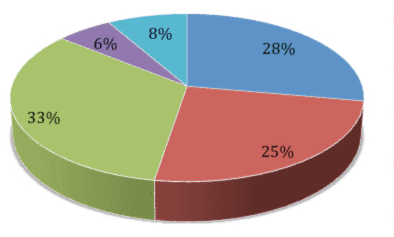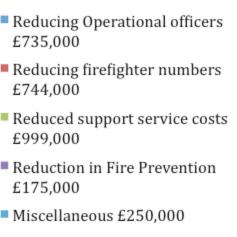
Shropshire Fire and Rescue Service has “already delivered” many of the suggestions outlined in Sir Ken Knight’s report on cutting expenditure in national fire and rescue services, it was revealed today.
Fire deaths and injuries and the number of accidental house fires in the county are down while fire engines and firefighter numbers have also fallen in proportion.
The fire service in Shropshire costs only £43 per head of population compared to almost £60 for the most costly fire services.
Shropshire Fire and Rescue Service was “well ahead” in its efficiency compared with many other fire and rescue services but any more financial cuts could seriously impact on the frontline service to the people of Shropshire, warned Chief Fire Officer Paul Raymond.
“As one of the most efficient and effective Fire Services in the country, it is not surprising that most of the areas of good practice identified in the report have already been delivered by Shropshire Fire and Rescue Service.
“The report is very welcome as it recognises what we have been saying to Government since 2009, that this Service is well ahead in terms of efficiency and that further deep cuts to our funding could impact on the quality of service we can provide.”


Pie chart shows where £3.2 million has been already cut from the Shropshire Fire and Rescue Service budget – with more severe cuts on the way
Paul Raymond has already said that they are now having to consider fire station closures, a possible merger with neighbouring fire and rescue services and further cuts on the number of fire engines.
“In Shropshire the Brigade has worked hard since 1998 to reduce the number of fire deaths and injuries and has been successful in achieving a 69% reduction and a 14% reduction in the number of accidental house fires since 2002 but we have reduced our level of service provision accordingly, exactly as Sir Ken’s report suggests’ he said.
A total of 20 per cent of Shropshire’s fire engines have been lost in the same time with reduction in fire engines in Whitchurch, Market Drayton, Newport, Bridgnorth and Ludlow. Firefighter numbers are down 10 per cent with a 25 per cent reduction in incident commanders.
“The Audit Commission, in the many years it audited this authority, recognised that we were in the top three most efficient and effective services in England.
“As Sir Ken’s report states it is not clear why so many services are much more expensive than the average.”
In recent reports the Service has plans for making itself even cheaper with total reductions in cost between 2010 and 2020 of 20%, currently achieving a £3.2 million cost reduction without impacts on the front line.
Stuart West, Chair of the Fire Authority said today that the Fire Authority has always been determined to deliver an excellent service, at a cost that is acceptable to local people.
“The Fire Authority welcome Sir Ken’s report. It contains many of the areas we discussed with him during his visit here and highlights as good practice many of the actions we have already taken.”
“We are also currently reviewing almost 60 options to further reduce cost to taxpayers including options for closures of fire stations, further reductions in the number of fire engines and merger with other fire and rescue authorities as suggested in Sir Ken’s report.”
These options are being discussed with staff before full consultation with the public early next year, he said.
One area of the report that raised concerns with the Chief Fire Officer was that there was no mention of the minimum standards of front line service that the public should expect.
“I am concerned that Sir Ken’s report seems to miss the fact that you can only cut a fire service to a minimum level of acceptable service provision.
“I believe that our current level of provision with people waiting 15 minutes for a fire engine, is the minimum level of provision.”
Sir Ken said in his report: “I am concerned that there are some authorities that would not be able to meet the challenge should substantial further [budget] reductions be applied equally across the board.’
“Many of the more costly services guarantee a fire engine in six minutes or less and perhaps Sir Ken’s report will lead to a discussion on a return to national minimum standards for the Fire Service and how efficiencies can be generated nationally from that.” he added.




